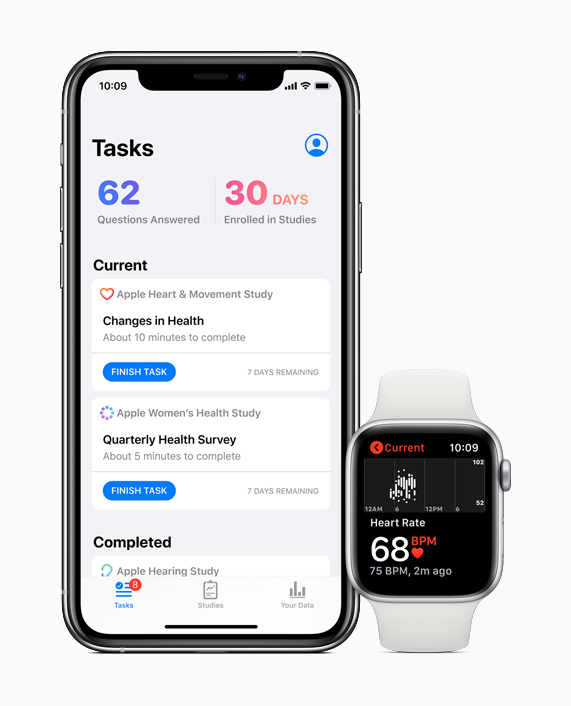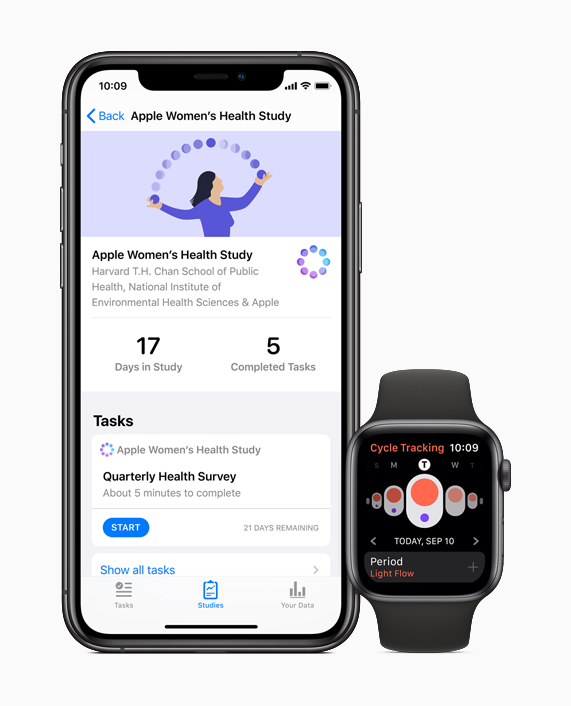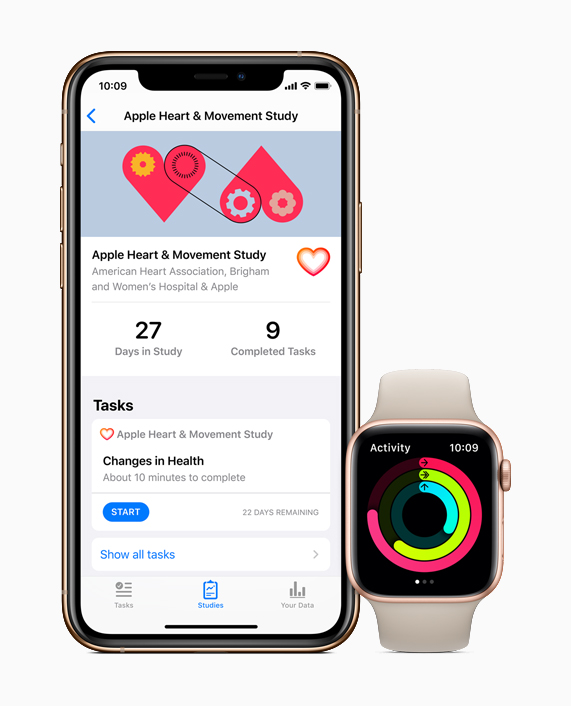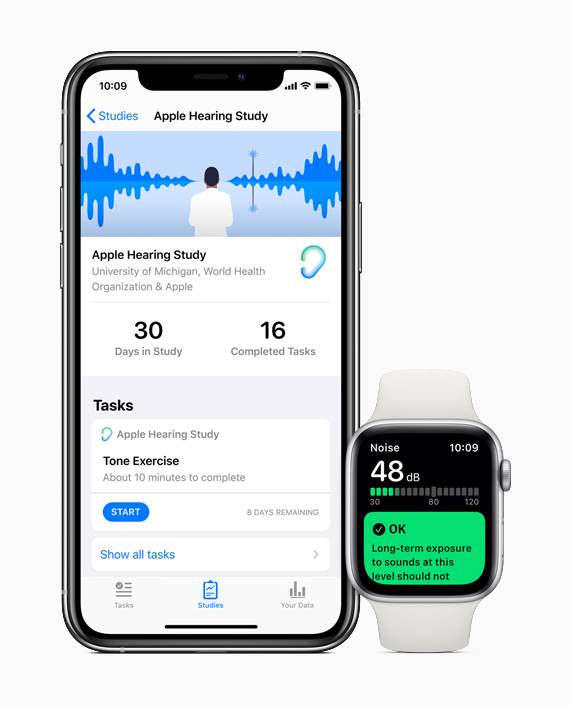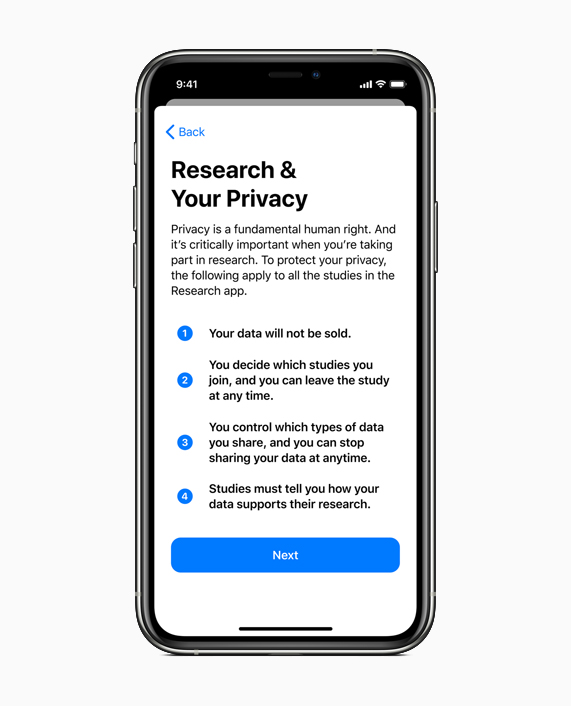PRESS RELEASE
November 14, 2019
Apple launches three innovative studies today in the new Research app
The Apple Heart and Movement, Women’s Health and Hearing Studies Now Open for Enrollment
Cupertino, California — Apple today announced that customers in the US can enroll in three landmark health studies — the Apple Women’s Health Study, the Apple Heart and Movement Study, and the Apple Hearing Study. Conducted in partnership with leading academic and research institutions, these multi-year longitudinal studies are available in the new Research app, which can be downloaded today from the App Store. Now participants can contribute to potentially groundbreaking medical discoveries with iPhone and Apple Watch, and help create the next generation of innovative health products.1
“Today marks an important moment as we embark on research initiatives that may offer incredible learnings in areas long sought after by the medical community,” said Jeff Williams, Apple’s chief operating officer. “Participants on the Research app have the opportunity to make a tremendous impact that could lead to new discoveries and help millions lead healthier lives.”
Now it’s easier than ever to contribute to medical research through a streamlined enrollment process and engaging tasks in a straightforward and secure app. After enrolling in a study, participants using Apple Watch and iPhone can contribute useful data around movement, heart rate and noise levels — captured during everyday activities, from taking a walk to attending a concert. The Research app joins Apple’s lineup of products and services that enable medical discovery on a scale never before attempted, including iPhone, Apple Watch, ResearchKit and HealthKit.
The Apple Women’s Health Study
There is a great opportunity to better understand menstrual cycles and how they relate to women’s health. The Apple Women’s Health Study is the first long-term study of this scale and scope; it aims to advance the understanding of menstrual cycles and their relationship to various health conditions, including polycystic ovary syndrome (PCOS), infertility, osteoporosis and menopausal transition. Conducted in partnership with Harvard T.H. Chan School of Public Health and the NIH’s National Institute of Environmental Health Sciences (NIEHS), the study will use iPhone and Apple Watch to collect study-specific data like cycle tracking information, and use monthly surveys to understand each participant’s unique menstrual experience. The study seeks to analyze the impact of certain behaviors and habits on a wide breadth of reproductive health topics.
The Apple Heart and Movement Study
Measuring the quality and quantity of a person’s movement can provide insight into their current and future health status. The Apple Heart and Movement Study is a broad study of factors that affect heart health and potentially cause deterioration in mobility or overall well-being, in an effort to promote healthy movement and improved cardiovascular health. Users can participate by using the Research app on their iPhone and recording workouts on their Apple Watch Series 1 or later. With Brigham and Women’s Hospital and the American Heart Association, Apple is taking on this study to understand how certain mobility signals and details about heart rate and rhythm could serve as potential early warning signs of atrial fibrillation (AFib), heart disease or declining mobility, to build new interventions that could help consumers lead longer, healthier and more active lives.2
The Apple Hearing Study
The impact of sound exposure on hearing health and stress levels over time is not well understood. The Apple Hearing Study will collect headphone usage and environmental sound exposure data through iPhone and the Noise app on Apple Watch, in order to explore how both can impact hearing over time. Alongside the University of Michigan, the study will also determine how long-term sound exposure can impact stress levels and cardiovascular health. Participants will be randomly assigned to two groups within the study to assess if receiving Health app notifications when loud sound exposure is detected can motivate users to modify their listening behaviors. Data from the study will also be shared with the World Health Organization (WHO)’s Make Listening Safe initiative to raise awareness of safe listening practices with the aim of reducing hearing loss.
As one of its core values, Apple believes that privacy is a fundamental human right. Therefore privacy is built into all products and services from the beginning. The Research app was carefully created to only share data with the chosen studies when the user approves. It also includes a clear enrollment flow with detailed consent that explains how data will be used and allows a user to control the type of data shared with each study.
Images of Apple Health Studies
- 1 The Research app is available on iPhone 6s or later with iOS 13.2 or later.
2 The Apple Heart and Movement Study requires Apple Watch Series 1 or later with watchOS 6.1 or later.
